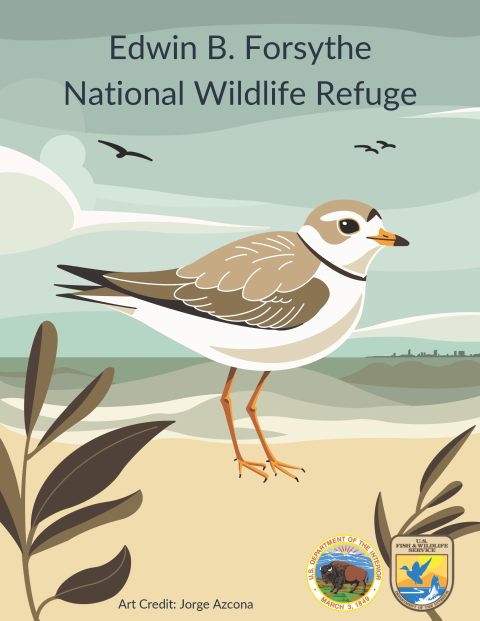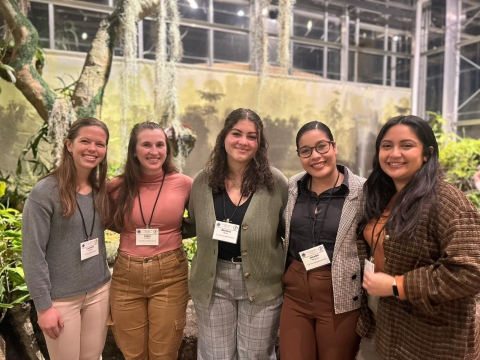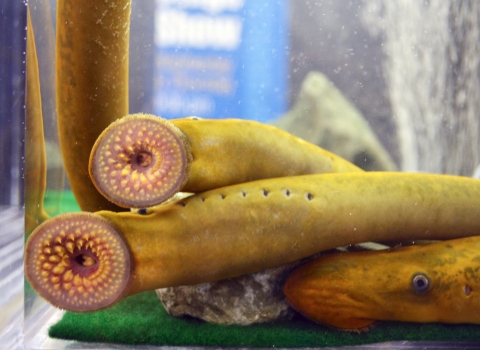Addressing climate change climate change
Climate change includes both global warming driven by human-induced emissions of greenhouse gases and the resulting large-scale shifts in weather patterns. Though there have been previous periods of climatic change, since the mid-20th century humans have had an unprecedented impact on Earth's climate system and caused change on a global scale.
Learn more about climate change on military installations, connecting with new audiences through art and introducing kids to the outdoors. This is some of the important work done by Hispanic Access Foundation fellows this year.
The U.S. Fish and Wildlife Service partners with the organization to connect college students and recent grads to careers in natural resource conservation. Through hands-on experience and mentorship opportunities, we aim to foster a new generation of conservation leaders.
Meet some of our Northeast Region’s 2024 fellows and learn about their experiences!
Jorge Azcona, Urban Community Engagement Fellow, Edwin B. Forsythe National Wildlife Refuge
Jorge Azcona’s heart belongs to Atlantic City. Born and raised there, he blends his passion for art with a dedication to urban community engagement and amplifying marginalized voices.
Jorge brought his talents to Edwin B. Forsythe National Wildlife Refuge, where he worked to connect underserved communities and potential partners to the mission of the refuge, which protects more than 48,000 acres and 50 miles of coastline in southern New Jersey.
During his fellowship, Jorge found creative ways to blend art with outreach products to help new audiences see and appreciate wildlife conservation through a different lens.
“Art can be a powerful tool for many people, as it can draw up a lot of emotions and spark many conversations,” Jorge said. “There’s a lot of beauty in nature, and sometimes capturing that in any medium can connect people to nature in ways that they never thought about.”
Additionally, Jorge kept busy through a variety of refuge projects, from event planning to supporting the refuge biological team. As a lifelong lover of waterfowl, one of his major highlights was helping with goose banding — and getting to hold little goslings for the first time.
“That really made my summer,” he said.
Jorge deeply values maintaining a strong connection to culture and identity as a source of direction and inspiration. His touchpoints are vast and varied — from the subversive, wall-of-sound punk and shoegaze of the 90s (think Sonic Youth, My Bloody Valentine and Bad Brains) to his deeper roots as a person of Mexican and Indigenous heritage.
“Growing up, I felt very out of touch with my culture, but as I've gotten older, I’ve realized that it never really left me,” he said. “From the traditions that my family practice, to the food that I eat, to the language and stories that we speak, it has always been a part of me. As I continue to reconnect and learn more about it, I want to tell those stories in my artwork.”
Jorge plans to continue pursuing art while working part-time at a local nonprofit dedicated to addressing food insecurity in Atlantic City. He dreams of one day starting an organization dedicated to culture and programming within the Latino community.
Caroline Weiss, Integrated Natural Resource Management Plan Climate Fellow, Northeast Regional Office
Growing up in Lancaster, Pennsylvania, Caroline’s love for the outdoors grew steadily through weekend hikes, Farm Camp and vacations in the majestic White Mountains of New Hampshire. When it came time to pick a college major, she chose environmental studies and never looked back.
As an Integrated Natural Resource Management Plan Climate Fellow (she prefers “climate fellow” for obvious reasons) for the Northeast Region, Caroline researched and analyzed climate hazards on military installations in the region. She synthesized this information into climate profiles that will be published as appendices to the installations’ Integrated Natural Resource Management Plans.
It’s serious work, with a serious payoff. The Department of Defense manages more than 27 million acres across the U.S.; that means her efforts to support climate-informed natural resource management will have a significant positive impact.
“The growing partnership between the Service and the Department of Defense on climate change and biodiversity protection inspires me,” Caroline said. “The fact that this fellowship exists exemplifies how committed these two agencies are to better understanding and adapting to climate change.”
Caroline used her time as a climate fellow wisely, soaking up as much knowledge as she could about the ins and outs of the agency. One of her favorite experiences was attending the Climate and Conservation Summit at the National Conservation Training Center — or, as she calls it, “the Hogwarts of the Fish and Wildlife Service” — where she brushed shoulders with inspiring conservation leaders from the Department of Defense and our agency.
If she’s not working, Caroline’s probably outside running, hiking or kayaking. After finishing her fellowship, she hoped to dive full-time into conservation.
“I feel much more equipped and am excited to continue work in the environmental field because of this fellowship,” she said.
Cindy Zamarripa, Urban Community Engagement Fellow, Parker River National Wildlife Refuge
“It’s funny how things work out,” said Cindy Zamarripa. “I used to be indifferent about being outside, but now I have a job that requires me to be outdoors all the time.”
And it suits her. As Urban Community Engagement Fellow at Parker River National Wildlife Refuge, on the Massachusetts coast north of Boston, much of Cindy’s time was spent in the nearby city of Lawrence, where she worked with Mass Audubon staff to provide afterschool educational programming.
Much like the youth she worked with, Cindy was once a city kid with few opportunities to enjoy the outdoors. Growing up in a low-income household and often facing security and safety issues, outdoor recreation was rarely in the cards for her.
That is, until she gained a mentor from Solutions for Change, a nonprofit organization that helps individuals and families facing homelessness. Her mentor began taking her on long, weekend hikes, providing Cindy with much-needed relief from the stressful and chaotic environments she lived in.
Over time, Cindy began taking note of the natural environment around her, becoming more curious about it and receptive to it. A switch had flipped.
“I like to think that helped bring a color to the outdoors that otherwise would have gone ignored for me,” she said. “From black and white to hues and shades of color.”
Today, Cindy strives to pass along that same level of support, comfort and encouragement to others so they, too, are empowered to enjoy the outdoors.
“Many of these kids that I work with don’t have the resources or have someone in their life to ignite that spark,” Cindy said. “I want to inspire them as much as my mentor has done for me during tumultuous points of my life.”
Cindy credits her educational background in anthropology for equipping her with the tools and perspectives to better understand and navigate the world, particularly when it comes to social issues that affect marginalized communities. She strives to lead with curiosity, care and compassion for others each day, in and out of the workplace.
“By understanding hidden barriers and privileges, we can work towards creating new community identities that everyone can connect with,” she said. “That’s a vision I want to be a part of and have a hand in helping with.”
As a first-generation Latina graduate whose educational background is not strictly STEM-related, Cindy’s passionate about the need for more diversity and representation within the conservation field. She sees the partnership between the Service and Hispanic Access Foundation as a great step towards achieving that.
“When I first heard about this position, it genuinely made me excited about the potential opportunities and growth it can have for representation for people like me, who are more often than not left out of the bigger picture, especially in conservation work.”









